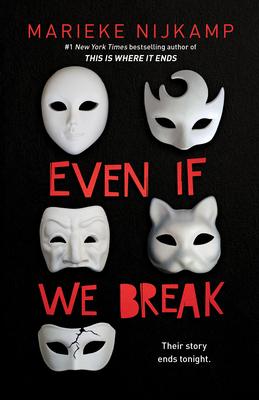
Locked-door mysteries are tricky. Done well, they are thrilling reads because you can rarely solve the mystery before the author reveals the answer. Done poorly, they are predictable and painful. I jumped at the change to read Even If We Break by Marieke Nijkamp because I enjoyed another novel of hers and hoped that she would write a good locked-door mystery. It turns out she did not, and the experience was a lot more trying than I expected.
Even If We Break starts well. Ms. Nijkamp works to establish an appropriate setting – remote, mysterious, a grand house that comes with its own ghost story – as well as to introduce the cast of characters. She does well with the setting and with the characters. Like any good locked-door mystery, the characters have diverse backgrounds, but their differences do not end there. Ms. Nijkamp adds more diversity in the form of gender identification and sexual preference to make this group as unalike as possible. Sadly, these differences are what weaken the story.
I say this not because the diverse traits of the characters are bad. In fact, that was my favorite aspect of the story. I say this because their differences weaken the premise, which then limits the believability of certain plot points, making the riddle way too easy to solve. The idea that a group of high school students who are no longer friends would agree to get together for a weekend, not to mend fences but to play the game one last time, is one I struggled to accept. It didn’t matter if there was a murder or not, you knew upon a clear explanation of the weekend’s agenda that nothing good could come of it. High school kids rarely make up with former friends so soon after their rifts. It takes the clarity and wisdom of age for that to happen, something graduating seniors still do not have.
Plus, Ms. Nijkamp really hammers this idea of friends growing apart but coming back together in the spirit of forgiveness and solidarity. If half of the plot is about the murder that occurs, the other half is about friendship and what a person’s responsibility is to that friendship when things go sour. It is an odd dichotomy, one I found distracting as well as annoying. Even at the height of the suspense, as the survivors were about to find out who the murderer is, Ms. Nijkamp manages to squeeze in a few paragraphs about friendship. Not exactly what I wanted to read about at that point in the story!
I mentioned the predictability, but I have to stress just how predictable it was. I knew who the murderer was upon the discovery of the first crime, and there were four more to go after that. The mystery aspect of the story reads like a mystery checklist. You can almost see Ms. Nijkamp going down the list to check off each element as she adds it. There is no real attempt to confuse readers; she adds one or two red herrings, but they were obvious as obvious to me as if she had used red font to identify them as such. Again, this is not what you want when reading a mystery.
I had high hopes for Even If We Break. The publisher’s synopsis is fabulous. The problem is that it makes it sound a lot more exciting than it really is. I never felt any of the characters were in danger. In truth, I never really felt for any of the characters in general. I welcome the diversity among them, but I believe Ms. Nijkamp never bothered to develop her characters beyond their differences. Add to that heavy-handed messaging and a mystery that really is not a mystery, and the whole experience is a disappointment.
